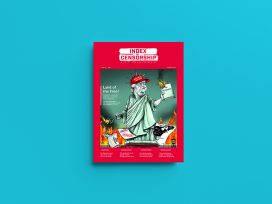There’s a lot of anger going around in the U.S. these days, but it’s not always clear what and whom it’s directed against.
Angry voters in Massachusetts recently turned over to a Republican the Senate seat that had been Democrat Teddy Kennedy’s for 46 years, but even the pollsters weren’t sure why. Was it a protest against a terrible Democratic candidate, the fact that the Obama administration hadn’t taken enough action against Big Business, or the possibility that a federal health care bill might weaken Massachusetts’s own perfectly good health care programme? No one could say, except that the voters wanted a change.
Anger was bubbling up in Washington, too. Congressional committees were busy asking embarrassing questions of investment bankers and slinging mud at them in the press. The only problem was that they couldn’t agree on any legislation that even slapped the hands of the business leaders whom they were railing against – the heads of big banks who continue to reward themselves with multi-million dollar bonuses.
In the White House, the President, usually a master of sang froid, was also boiling: “If [the financial industry] wants a fight,” he said in a recent press conference, “that’s a fight I’m ready to have.”
Much of this anger has to be free-floating anxiety about the economy. And at least on the surface, whether out of political expediency or deep conviction, Obama has begun to act as well as sound tough.
In the last 10 days he’s put forth three important economic proposals: to impose a 90 billion dollar tax on banks that benefited from the federal rescue program; to have Congress create an independent consumer protection agency to investigate risky bank practices; and to limit the size and scope of the banking system, effectively stopping banks from gambling with depositors’ money.
This last is the most important by far. Though short on details (a constant problem of Obama’s policy- making style), it’s been dubbed “the Volcker Rule” in honor of the 83 year-old ex-head of the Federal Reserve. Blunt and incorruptible, Paul Volcker was the first public figure to speak out about the greediness of the banks, and to call for them to return to their role as commercial lending institutions. Newspapers have been filled recently with pictures of a tight-lipped Obama, with a scowling Volcker standing by his side.
There’s good reason for Volcker to scowl. As an old pro in Washington politics, he knows that these proposals have about as much chance of getting through Congress as politicians have of getting into Heaven. Over the last few decades the federal government has rigidified so much that the core assumption of democracy – that rational people can compromise for the “common good” – seems as archaic as the dodo.
Instead, in this first year of the Obama administration, Republicans lined up in military lockstep behind their leaders, while Democrats spent months writing complicated bills to please all their interest groups. When it came time to vote, they looked like the Sharks and the Jets in “West Side Story” – overgrown boys combing their hair before the mirror, then striking childishly threatening poses for the camera.
A recent Supreme Court decision made the situation even worse. By a 5-4 vote – largely due to Bush-appointed Justices – the Court declared that corporations are free to contribute as much as they want to any and all political campaigns. It’s a true disaster: the misguided decision catapulted American politics back to the nineteenth century, where one Senator was known as “the Senator from Standard Oil”, another as “the Senator from U.S. Steel”. In this poisoned air, elected representatives aren’t likely to compromise about anything – not if they expect to get money for TV ads in their next campaign. No wonder Volcker is scowling.
The question of whether the President can get his economic ideas through Congress may be the wrong one to ask. For one thing, his proposals don’t go far enough. The whole issue of gambling instruments with arcane names like credit default swaps and collateralized debt obligations – those concoctions of investment bankers that almost brought the whole banking system to ruin– is hardly touched on in the administration’s proposals. Though months ago financiers like George Soros called for the abolition of credit default swaps (while he made huge profits from them), the President has avoided the issue. One can only hope that he’ll get to it soon: reckless gambling by financial institutions is at the heart of the problem.
The real question is whether the administration’s get-tough policy is just whistling in the dark. In his State of the Union speech, Obama acknowledged that the country is mired in economic problems, and offered some modest proposals for job growth. Yet his strongest words were directed at the Congress for not getting anything done.
Even as he spoke, however, the unemployment rate was creeping upward (one analyst predicts 15-17 per cent unemployment for the next 7 years); the housing and commercial real estate markets were in deep trouble (the New York City commercial market volume dropped an astounding 90 per cent last year); the dollar’s power and influence continued to diminish while the Chinese economy grows; and mortgage foreclosures, the collapse of local banks, and personal bankruptcies kept increasing.
One suspects that the underlying reason for the anger in the country might be an unstated one. No one has dared yet to say the Unsayable: despite optimistic reports and a rise in the stock market, we may be moving closer to a major Depression.






